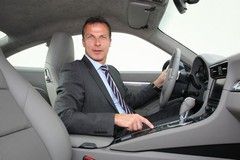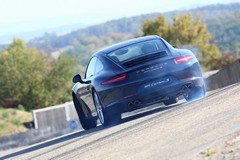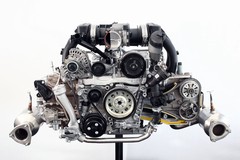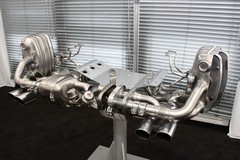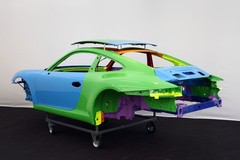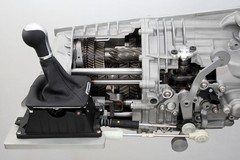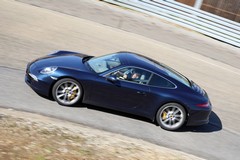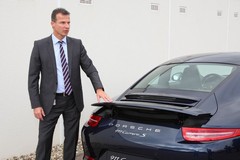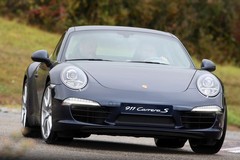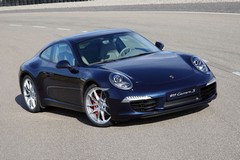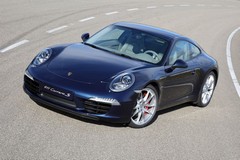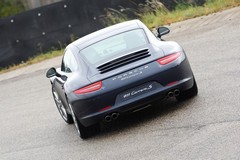PH Meets The 911's 'Director Of Emotions'
Q & A: Dr. Bernhard Pfäfflin, and the new 911 Carrera
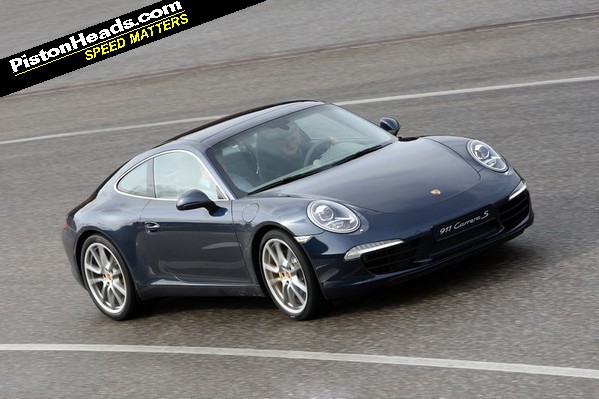
It still looks every inch a 911 (no surprises there), but the new design is centred around a 100mm longer wheelbase compared to its predecessor, and the changes have seen the new 991 in Carrera S guise with all optioned goodies conquer the Nürburgring in 7-minutes 40-seconds; an incredible 14-seconds faster than the equivalent 997.
One of the brains behind the new 911 is 'NVH' man Dr. Bernhard Pfäfflin, and PH bumped into him at a 911 test day at Weissach. (That's 'bumped into' in the Liam Fox sense. Ed.)
Q1. Dr. Bernhard Pfäfflin, is it fair to say you're the Director of Emotions when it comes to Porsche's new 991 Carrera?
BP: (laughs) It's not my official title; I am the General Manager of the Noise and Vibration Department at Porsche, but dealing with some of the emotional elements that come with owning a 911 is part of my job.
Q2. So it is you who has final say on how desirable the 911 sounds is, which we must say, is something rather special.
BP: I do very much love my job, and I'm lucky that I have always loved the sound of the 911 and Porsches in general.
Q3. It is a huge challenge for everyone at Porsche to evolve the 911 with each generation, what have been the biggest steps forward with the new 991?
BP: There are so many important new things in the new car, but for me, I'd say it is the 100mm addition to the wheelbase, which was the start point for the 991's driving dynamics and safety. Also, the weight difference thanks to the aluminium construction (44% of the new 991's body is made of aluminium) means a huge difference over the older 997 model.
Q4: For the first time in the 911's history, engine displacement has gone down in the entry level Carrera (3.6-litres to 3.4-litres). Will 911 fans be surprised or even disappointed by this?
BP: I don't think so. The size of the engine isn't really important, but the improvements are. Yes, it is smaller, but it makes more power than the older 3.6-litre; is stronger and has lower fuel consumption. People will accept this, as after all it's still a six-cylinder boxer. It is most important for customers to drive the new car and feel how good the engines are, especially when compared to the 997's 3.6-litre.
Q5. A car's economy is fundamentally important these days, was it a challenge for this latest 911 to be a true sportscar and economical?
BP: Yes, it's always a big challenge, but it makes the goal for all of us very interesting. It's a traditional car (naturally aspirated petrol engined), so we have to improve its economy in very special ways. We therefore have the weight reduction, a very low drag coefficient, and Porsche Intelligent Performance functions, such as the automatic start-stop and electrical system recuperation.
Q6: The 991 is still unmistakably a 911 in its exterior design, but there have been significant changes to the body, haven't there?
BP: It still looks like a 911 should, and these changes are looking very good. Before we had a very short wheelbase, but the longer wheelbase now I think fits better with the proportions of the vehicle. The windscreen is also much flatter and this makes a big difference to the design and aerodynamics.
Q7: Many 911 purists are worried by the introduction of electro-mechanical power steering in the new 991. Can you assure them the system doesn't compromise the renowned feel 911 owners speak fondly about?
BP: Some of our competitors use only electric power steering, but we have a mechanical system that works with the electrics in the new car. The feeling and feedback is still excellent: it's like before, if not better than before.
Q8. Is there a danger of fitting too much technology in a 911? Certain owners may think some of the new systems are unnecessary in their sportscar...
BP: I think technology is very important for Porsche customers, especially in the 911. Many who will buy the 991 will have owned a 911 before, and they like the technology and want the next thing.
Q9. We're seeing a seven-speed manual gearbox for the first time; this is surely the end isn't it, or will we one day see eight- or nine-speed manuals?
BP: I'd never say never, but you really wouldn't need more than seven with a manual. Importantly with this gearbox, seventh gear is for cruising only and to help economy. The highest speed is reached in sixth gear still, and you'd only use seventh for the motorway, not on the race track.
Q10. You work in the emotions department with the noise and vibration that fills the cabin; do other car companies have such departments?
BP: Other companies have similar, but I don't think they have as many emotions as Porsche. We specialise in sound development, and work hard to get the right noise for the car.
Q11. The new 991 Carrera does sound incredible, so good work there. Is there a car the sounds better in your opinion?
BP: At the moment, I think the sound of this 991 Carrera is the best. I personally like the 997 GT3 sound very much, especially the 997 GT3RS 4.0. They sound nearly like a race car, which I like very much. Every day we hear sound tuning on our race cars, so we know where our normal road cars have to be.
Q12. And a 7-minute 40-seconds lap of the Nürburgring for the Carrera S, was that a surprise?
BP: It was a big surprise, but a very good one! To go 14-seconds faster than the 997 was incredible, a huge amount. Normally we'd only expect improvements in 1/10s of seconds.
Q13: So as and when a 991 GT3 arrives, surely we can expect even more headline grabbing Nürburgring lap times?
BP: At the moment there is no decision that we will develop a 991 GT3. But if we do, it will have the long wheel base and light body, which combined with the other GT3 features, will improve the Nürburgring lap time again.
Q14: And finally, the Porsche 911 is nearly 50 years old as a model. Do you think they'll be made until the end of time, and what can we expect from the 911s in ten years' time?
BP: As long as Porsche is there, there will be a 911. It's the backbone of the company, and for many people, the main reason we are working for Porsche. I think the 911 in 2021 will still have an internal combustion engine, still in the back of the car, and in my opinion, the comfort and sportiness will increase. On one side the likes of engine performance and braking performance will improve, but so also will driving comfort and reduction of background noise. Plus, driver assist and safety systems will increase.
Interview and article by Iain Curry
Gassing Station | General Gassing | Top of Page | What's New | My Stuff

